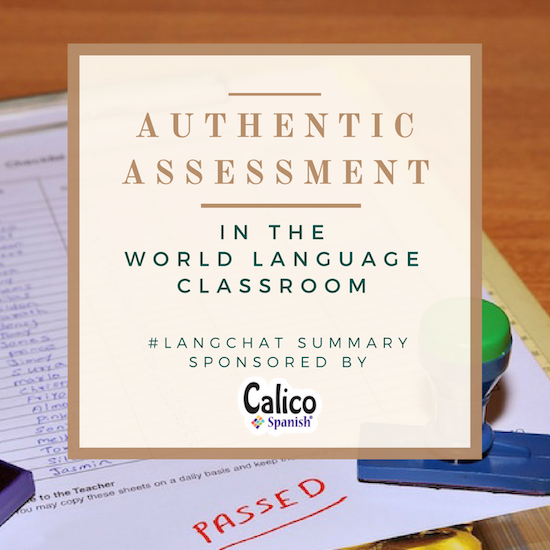Authentic Assessment in the World Language Classroom
Thanks to all our dedicated #LangChat twitter participants who shared great ideas and resources on conducting authentic assessments in the language classroom. We had a lively discussion on what exactly is authentic assessment, how to plan for it, and which techniques have proven successful.
 What is Authentic Assessment?
What is Authentic Assessment?
Authentic refers to real-life situations. Several participants stated that for an assessment to be authentic, the situation must be believable–or even be real. Finding students a real audience (such as native target-language speakers) is key to being able to properly assess and motivate them.
@tmsaue1 related how he once heard that “make believe” is not authentic. Several teachers questioned how you can get away from “make believe” activities in the classroom, though. Unfortunately, classroom limits often make pretending unavoidable. Sometimes you have to imagine what life “could be like if…,” but you can make that as realistic and relevant as possible (@CalicoTeach). The point might be to give students a role that makes sense for them, without having to go to great lengths to pretend (@SraSpanglish).
In general, think of authentic assessments as functional–can students fulfill a real-life task? (@lovemysummer)
– Follow the blog on Bloglovin –
How Can We Design Authentic Assessments?
Since we teach in a classroom, creating truly authentic assessments is a challenge. Participants had some handy advice on how to work around these limitations.
- Several people mentioned taking an otherwise unauthentic situation, such as being a waiter at a French restaurant or an emcee at a fashion show, and changing it to match something students could conceivably do. Examples included imagining you’re hosting a dinner party for French guests (@CalicoTeach) or creating conversations along the line of “Did you see what she was wearing!?” (@SraSpanglish).
- Use backwards design. Start with the end goal in mind (what do you want students to do) and then design the assessment. Also imagine: If students are in the target culture, will they have to do this? @suarez712002
- Try having your students create their own assessments either alone or with partners. This way the assessments are more authentic, and the students really get engaged. @mthornton78
- Let kids be social in ways that are familiar to them for the most authentic assessment. @mmebrady
- Several people mentioned working with classes and individuals in other countries and communities. Try Partners of the Americas for ideas (@DiegoOjeda66). Also check out getting connected to your city’s sister cities (@klafrench).
– Like Calico Spanish on Facebook –
Examples of Authentic Assessments:
Participants shared a wealth of ideas for authentic assessments! Here are some of their tips.
- For the future tense, have students post a prediction about what other students will be doing in twenty years.
- Have a debate or a mock election for class president. Students have to write campaign promises, make Glogster posters, and narrow the field down to two individuals for a debate. @mmebrady
- Several teachers mentioned that they had had success having students make comic strips. The difficulty is in how you can relate the comic to real life. Try to think about the functions of the language they will use in real-life situations (@suarez712002). Have students make comic strips to explain what happens in their favorite movie. You’re assessing their ability to talk about a movie they saw–something teens do all the time (@SECottrell).
- Some comic-making tools include: Bitstrips, ToonDoo, or check out SECottrell’s ‘Comics’ tag on Delicious at http://bit.ly/e8Gp0m.
- Use the school newsletter to provide movie or song reviews in the target language. Have students do video personal ads (for celebrities or famous characters if they prefer). Instead of basic audio scripts, try authentic radio commercials. @SraSpanglish
- Pubzagogo is great for French commercials, although under construction at the moment. @mmebrady
- Many ideas were shared on authentically assessing a clothing theme! Use these thoughts to personalize any vocab set you can think of:
- I do a scavenger hunt for vocab using old clothing catalogs. @klafrench
- Imaginary packing list for a camping trip, or figure out what your mom purchased for you by viewing the receipt. @CalicoTeach
- Several participants suggested using department stores’ online sites for scavenger hunts or shopping sprees by giving students a list of items to buy or a set amount of (imaginary!) cash.
- Have students plan a whole weekend for a visiting friend. They pick the city and find malls, cinemas, restaurants, and parks online. @DiegoOjeda66
- Have students tweet native target-language-speaking students: the new pen pal? @LYRichardson
- I tried that (tweeting)–students complained their friend followers didn’t like their Spanish tweet stream. @SECottrell
- I’m using ePals. One good experience and one bad. @profeguerita
- This site has tons of examples at all levels: http://p21.org/documents/Skills%20Map/p21_worldlanguagesmap.pdf. @tmsaue1
- Have students create websites and comment on others’ sites. Topics can include assigned reading and current events. @cadamsf1
- I had students create mock airline sites, then use a classmate’s site to plan a trip. @mmebrady
– Follow Calico Spanish on Twitter –
What are some authentic speaking tasks that we can use in the classroom?
- Several teachers praised the benefits of using Skype or other means to partner with classes in the target language.
- Have kids make audio podcasts for news presentations. @cadamsf1
- Have students collaborate with other students in target language countries and work on common projects. @tmsaue1
- Students imagine they’re downtown and someone asks how to get from your location to another site. Tell them directions necessary and recommend things to do. @lovemysummer
- Have students record a GPS audiotrack. @mmebrady
Dealing with Online Translators in the World Language Classroom:
In addition to tons of helpful hints and ideas on using authentic assessment in the classroom, participants discuss the perils of online translators. We often want kids to jump straight from knowledge to synthesis, and they resort to online translators to cope (@mme_henderson). What can we do to prevent kids from abusing this resource?
- @emilymccarren shared a wonderful video she made to explain the hazards to students: http://tinyurl.com/3o4p365.
- I have past students verify that I’ll catch them 95% of the time, explain plagiarism, and emphasize simplifying language as a skill. @SraSpanglish
- It’s obvious when students use them; they get a 0 for plagiarism. Only WordReference is allowed. @SECottrell
- Teach students to ask for feedback from a native speaker. Students will realize there are many opportunities to put themselves out there and get assistance from native speakers; better than a computer translator. @CalicoTeach
- Show students how bad they can be. Show them a travel brochure written in English using a translator that’s hard to understand. @fravan
– Follow us on Instagram too! –
I hope you have gained some exciting new ideas from this group! Please join our weekly discussions on Twitter by searching for the #LangChat hashtag Thursdays at 8:00 p.m. Eastern time. Visit the Language Teachers Collaborate Wiki to share more ideas and resources with colleagues around the world and find easy access to summaries and archives of all the #LangChat topics.






4 Comments
Good sight for learning Spanish, I came here from your twitter account.I own a blog where I write about Learning Hindi and Bengali
Thanks for visiting. Best wishes with your work to teach Hindi and Bengali.
Hola Erica,
I am hoping to complete some action research on the use of social justice-related writing prompts as an authentic WL activity and came across your site. I am looking for research on the topic from peer-reviewed journals and wonder if you have one you put together while creating Calico. Thank you kindly! I teach Spanish at a public high school for the arts in WA.
Hola Harris, we do not have the resource you need but I’d encourage you to reach out on Twitter to the #langchat community using that hashtag to ask this question. I am certain the amazing teachers there will know where to guide you! – SEC